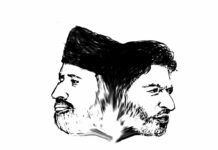Muhammad Maroof Shah
has been a growing presence of Islamic seminaries in the Valley catering to preserving and development of Islamic heritage. Historical role and current importance of madrassa education can’t be overemphasized. And it is one of the few surviving institutions of community that show our care and concern for our tradition and are thus vital to our identity. It is no wonder that people come forward to sponsor madrassa education and finance them liberally. Many of our greatest scholars are products of these madrassa.
There have been measures like introduction of English and computers in madrassa curriculum, after challenges faced by the modern education system. But no sincere efforts have been made to combat the disbelief that arise from modern science and philosophy
Although logic and parts of scholastic heritage have been parts of curriculum from the beginning, it appears that given the changed orientation of modern arguments against faith, we need to give consideration to inclusion of philosophy, especially the philosophy that has been traditionally cultivated by Muslims and is compatible with Divine revelation with regard to methodology and aim, and in fact, complements kalam tradition.
I think, we can and must suggest syllabi for seminaries because their objective is to teach Islam in contemporary idiom. If Aristotelian logic has been part of curriculum why veto new developments in logic? As theology has been under enormous criticism, it is philosophy that has to rescue kalam today if Muslim seminaries want to remain relevant.
There are lessons to be learnt from Iranians who never boycotted philosophy, in the name of religion. Assuming Law as the exhaustive expression of Islam is to forget both iman and ihsan as part of Islamic Tradition or Ad-Deen. Exhaustive expression of Islamic education must include due attention to intellectual, spiritual, artistic and other aspects of revelation. Revelation speaks to the whole man, not just to will. It speaks to the heart and the mind, to cognitive and aesthetic faculties, not just to volitive (will) faculty and the law pertains primarily to volitive faculty. No thinker in Islam has so far claimed that law is an exhaustive expression. If it were, there would be neither Junaid nor Mulla Sadra nor Ibn Arabi nor Farabi nor Ghazzali nor Ibn Sina nor Rumi nor Khusru nor Shah Waliullah nor Iqbal like figures in Islamic history. There would be no Taj Mahal or Mosque of Cordova or even calligraphy or Islamic sciences.
Today Dawah work needs philosophical training, at least in certain parts of the world or certain sections of addressees. If one doubts this, it means one is living in middle ages and has not heard of Nietzsche or Heidegger or Freud or Derrida.
If philosophy or love of wisdom or preparation for death or perfection of virtues (these are synonymous for traditionalist historians of philosophy and for those who have cared to read ancient philosophers of any tradition with any seriousness) how come you deny it is part of Islam? If Islam endorses hikmah and even if we grant its moral-spiritual aspect and not the intellectual one, as usually understood in terms of philosophy, one opens the room for philosophy in the sense I define the term.
(Author can be reached at: [email protected])















